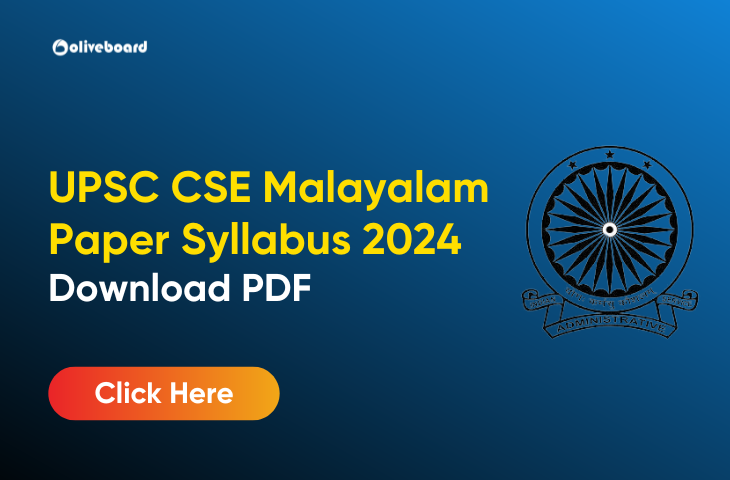UPSC Malayalam Syllabus 2024
The UPSC Malayalam syllabus 2024 will assess aspirants on their proficiency in the language. The exam pattern will remain similar to previous years. Candidates will be tested on comprehension of long and short Malayalam passages from diverse genres including literary, scientific and social themes. Their knowledge of grammar, vocabulary, idioms and syntax will also be evaluated.
You can download the UPSC CSE Malayalam Optional language paper syllabus from the direct link given below.
UPSC Malayalam Syllabus 2024 Overview
As a Dravidian language, Malayalam is used primarily in Kerala and neighboring states. Malayalam literature is an optional UPSC subject encompassing a rich literary heritage. The syllabus evaluates proficiency across two papers testing comprehension, grammar, vocabulary and literary analysis in written answers. Diligent preparation is key to succeed.
Malayalam Language Syllabus for UPSC CSE 2024
With ancient origins, Malayalam has a rich literary history covered in the UPSC syllabus. The two papers assess comprehensive language skills including linguistic evolution, grammar, key literary works spanning ancient to modern eras and various forms like prose, poetry and essays. Meticulous preparation is vital.
If you opt for Malayalam language as optional in UPSC mains, prepare it thoroughly. Go through the UPSC CSE Syllabus and previous years’ Malayalam papers. The CSE Mains includes two test papers on the optional subject selected by the candidate, each for 250 marks.
UPSC CSE Malayalam Syllabus 2024 for Paper 1
Section A:
- Early Phase of Malayalam Language:
- Various Theories: Explore different theories regarding the origin of Malayalam, including its connection to proto-Dravidian, Tamil, and Sanskrit languages.
- Relation between Tamil and Malayalam: Study the six theories proposed by A. R. Rajarajavarma regarding the relationship between Tamil and Malayalam languages.
- Pattu School: Define the concept of the Pattu School and examine its early works such as Ramacharitam, later works like the Niranam Works, and the Krishnagatha.
- Linguistic Features:
- Manipravalam: Define Manipravalam and analyze its language features in early works like Champu and Sandesakavya, as well as in later works such as medieval Champu and Attakkatha.
- Folklore: Explore the linguistic characteristics of Southern and Northern ballads, as well as Mappila songs in Malayalam folklore.
- Early Malayalam Prose: Examine the linguistic features of early Malayalam prose works like Bhashakautaliyam, Brahmandapuranam, Attaprakaram, Kramadipika, and Nambiantamil.
- Standardisation of Malayalam:
- Peculiarities of Language: Discuss the linguistic peculiarities found in the language of Pana, Kilippattu, and Tullal.
- Contributions of Missionaries: Analyze the contributions of both indigenous and European missionaries to the standardization of Malayalam.
- Characteristics of Contemporary Malayalam: Explore the characteristics of contemporary Malayalam, its usage as an administrative language, and its representation in scientific, technical, and media literature.
Section B: Literary History
- Ancient and Medieval Literature:
- Pattu: Discuss Pattu literature, focusing on works like Ramacharitam, Niranam Works, and Krishnagatha.
- Manipravalam: Explore early and medieval Manipravala works, including Attakkatha and Champu.
- Folk Literature: Examine the rich tradition of folk literature in Malayalam, encompassing various forms of oral and written expression.
- Kilippattu, Tullal, and Mahakavya: Analyze the characteristics and significance of Kilippattu, Tullal, and Mahakavya in Malayalam literature.
- Modern Literature—Poetry:
- Venmani Poets and Contemporaries: Study the works of Venmani poets and their contemporaries, exploring their contributions to Malayalam poetry.
- Advent of Romanticism: Examine the poetry of the Kavitraya poets, including Asan, Ulloor, and Vallathol, and their role in ushering in the era of Romanticism in Malayalam literature.
- Poetry After Kavitraya: Discuss the evolution of Malayalam poetry after the Kavitraya period and the emergence of new themes, styles, and poets.
- Modernism in Malayalam Poetry: Analyze the characteristics and impact of modernism on Malayalam poetry, including experimental forms and themes.
- Modern Literature—Prose:
- Drama, Novel, Short Story: Explore the development of various prose genres in modern Malayalam literature, including drama, novels, short stories, biographies, travelogues, essays, and literary criticism.
UPSC CSE Malayalam Syllabus 2024 for Paper 2
This paper will require first hand reading of the texts prescribed and is designed to test the candidate’s critical ability.
Section A
Unit 1
- Ramacharitam—Study Patalam
- Kannassaramayanam—Analyze the first 25 stanzas of Balakandam.
- Unnunilisandesam—Examine Purvabhagam, including 25 slokas and Prastavana.
- Mahabharatham Kilippattu—Focus on Bhishmaparvam.
Unit 2
- Kumaran Asan—Discuss “Chintavisthayaya Sita.”
- Vailoppilli—Study “Kutiyozhikkal.”
- G. Sankara Kurup—Analyze “Perunthachan.”
- N. V. Krishna Variar—Examine “Tivandiyile pattu.”
Unit 3
- O. N. V.—Explore “Bhumikkoru Charamagitam.”
- Ayyappa Panicker—Discuss “Kurukshetram.”
- Akkittam—Analyze “Pandatha Messanthi.”
- Attur Ravivarma—Study “Megharupan.”
Section B
Unit 4
- O. Chanthu Menon—Study “Indulekha.”
- Thakazhy—Analyze “Chemmin.”
- O. V. Vijayan—Explore “Khasakkinte Ithihasam.”
Unit 5
- M. T. Vasudevan Nair—Discuss the collection “Vanaprastham.”
- N. S. Madhavan—Examine the collection “Higvitta.”
- C. J. Thomas—Study “1128-il Crime 27.”
Unit 6
- Kuttikrishna Marar—Explore “Bharataparyatanam.”
- M. K. Sanu—Discuss “Nakshatrangalute Snehabhajanam.”
- V. T. Bhatttathirippad—Analyze “Kannirum Kinavum.”
The exam aims to gauge aspirants’ rich vocabulary through synonyms, antonyms and word usage. Regular practice of previous years’ papers is key to score well in this 100 marks UPSC mains paper. Candidates should focus on enhancing Malayalam reading and writing skills through newspapers, books and magazines for success in this section.
| Important Links | Important Links |
| UPSC CSE 2024 Apply Online | UPSC CSE 2024 Notification |
| UPSC CSE Eligibility Criteria | UPSC CSE Syllabus |
| UPSC CSE Exam Pattern | UPSC CSE Selection Process |
UPSC Malayalam Syllabus 2024 FAQs
The UPSC Malayalam syllabus 2024 will assess aspirants on their proficiency in the language. The exam pattern will remain similar to previous years. Candidates will be tested on comprehension of long and short Malayalam passages from diverse genres including literary, scientific and social themes. Their knowledge of grammar, vocabulary, idioms and syntax will also be evaluated.
Get Syllabus PDF here: UPSC CSE Malayalam Syllabus
There is 250 marks is for one optional paper.
